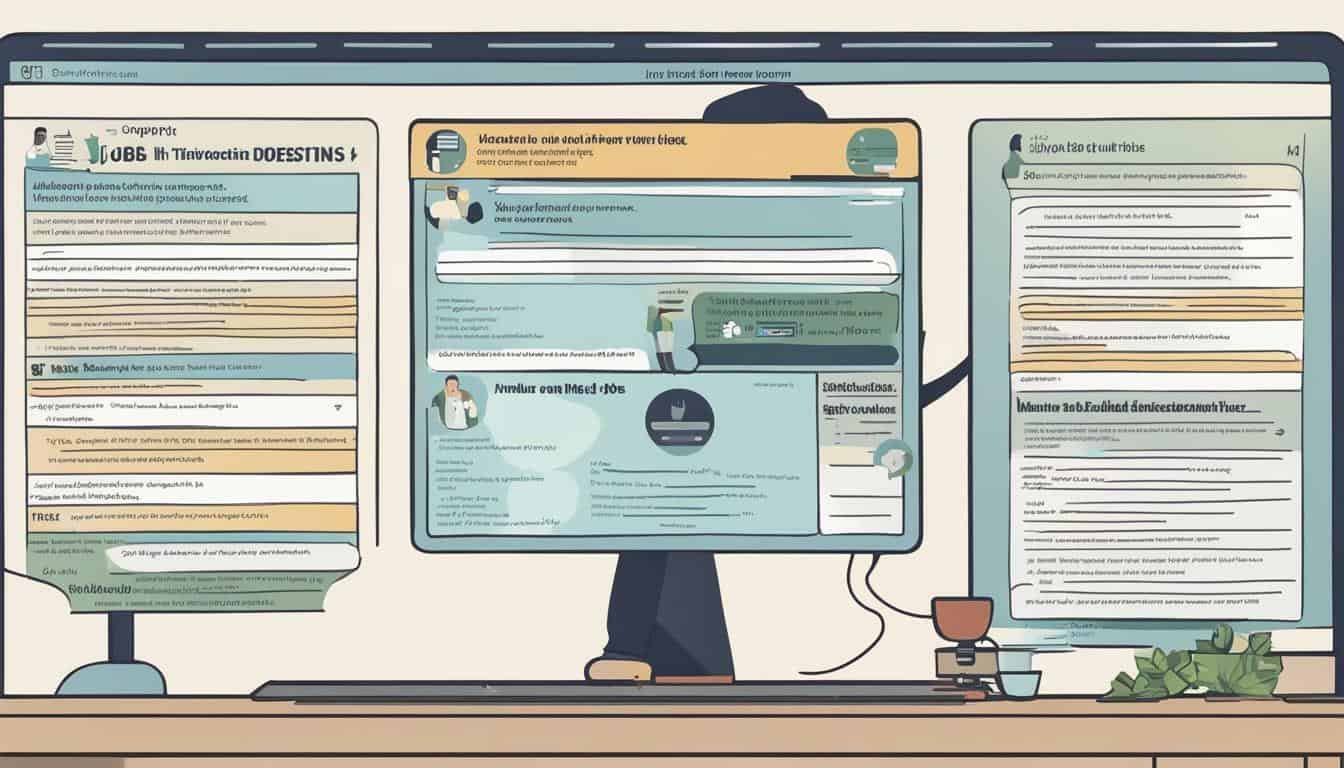If you have a passion for science and a desire to make a difference in the healthcare field, becoming a medical lab technologist may be the perfect career path for you. As a medical lab technologist, you will play a critical role in diagnostic testing and patient care.
Medical lab technologists, also known as medical laboratory technologists or medical technologists, use specialized equipment and techniques to analyze patient samples and provide accurate test results to healthcare professionals. These results play a crucial role in determining patient diagnosis and treatment.
To become a medical lab technologist, you will need to have a strong foundation in science and math, as well as a keen eye for detail and a commitment to accuracy. With the right education and training, you can build a rewarding career in this exciting field.
Key Takeaways:
- Medical lab technologists play a critical role in diagnostic testing and patient care.
- Strong science and math skills, attention to detail, and commitment to accuracy are essential for success as a medical lab technologist.
- With the right education and training, you can build a rewarding career as a medical lab technologist.
What Does a Medical Lab Technologist Do?
If you have an interest in healthcare and a love for science, becoming a medical lab technologist may be the perfect career for you. Medical lab technologists, also known as medical laboratory technologists or medical technologists, play a crucial role in the diagnosis and treatment of patients.
As a medical lab technologist, you will be responsible for performing a variety of diagnostic tests on patient samples, such as blood, urine, tissue, and other bodily fluids. You will use advanced laboratory equipment and technology to analyze the samples and provide accurate results to other healthcare professionals, such as doctors and nurses.
Medical lab technologists also collaborate with other members of the healthcare team to ensure proper patient care. You will communicate regularly with doctors, nurses, and other laboratory staff to ensure that the testing and results are accurate and timely.
To become a medical lab technologist, you must have a strong foundation in science, particularly in biology and chemistry. Attention to detail and critical thinking skills are also essential in this role, as the results you provide can have a significant impact on patient care.
Overall, the role of a medical lab technologist is crucial in the healthcare field. If you are interested in pursuing a career as a medical lab technologist, there are many educational and career opportunities available to you.
Education and Certification Requirements for Medical Lab Technologists
If you're interested in pursuing a career as a medical lab technologist, you'll need to meet certain education and certification requirements. Most employers require at least a bachelor's degree in medical laboratory science, although an associate degree or certificate program may also be acceptable.
When selecting a program, it's important to choose one accredited by the National Accrediting Agency for Clinical Laboratory Sciences (NAACLS) or the Accrediting Bureau of Health Education Schools (ABHES) to ensure you receive the necessary training and education.
In addition to obtaining a degree, you'll need to become certified through either the American Society for Clinical Pathology (ASCP) or the National Credentialing Agency for Laboratory Personnel (NCA). This involves passing a certification exam and meeting certain eligibility requirements.
It's important to note that each state has its own licensing requirements for medical lab technologists, so be sure to research the specific requirements in your state.
Skills and Qualities for Success as a Medical Lab Technologist
As a medical lab technologist, you must possess a variety of skills and qualities to excel in your profession. These skills include:
- Attention to detail: You'll need to be meticulous and detail-oriented when conducting tests and analyzing data to ensure accuracy and reliability.
- Analytical thinking: You must possess the ability to analyze complex data and interpret results to provide accurate diagnoses.
- Problem-solving abilities: You'll need to be resourceful and quick-thinking when encountering unexpected challenges while conducting tests or analyzing data.
- Effective communication skills: You must possess excellent verbal and written communication skills to collaborate with healthcare professionals, explain test results to patients, and document data accurately.
In addition to these essential skills, you'll also need a solid educational foundation and relevant professional certifications to succeed as a medical lab technologist. A bachelor's degree in medical technology or a related field is typically required, and many employers also prefer or require certification as a clinical laboratory scientist or medical technologist.
Job Outlook and Opportunities for Medical Lab Technologists
As healthcare continues to evolve and new technologies emerge, the job outlook for medical lab technologists remains strong. According to the Bureau of Labor Statistics, employment in this field is projected to grow 7 percent from 2019 to 2029, faster than the average for all occupations.
Medical lab technologists are in demand across a variety of settings, including hospitals, clinics, research facilities, and public health agencies. In these roles, they play a critical role in diagnosing and treating patients by performing and analyzing diagnostic tests.
Career Growth
There are many opportunities for career growth and advancement within the field of medical lab technology. Professionals can pursue specialized certifications in areas like molecular biology, cytogenetics, or blood banking.
As you gain more experience, you may be promoted to leadership positions such as laboratory manager, where you'll oversee the work of other technologists and ensure quality control measures are in place.
For those interested in research, a career as a medical lab technologist can serve as a stepping stone to becoming a research scientist. Alternatively, some technologists may choose to pursue a career in education, teaching the next generation of medical lab professionals.
Salary Expectations
The average salary for medical lab technologists in the US is $53,120 per year, according to the Bureau of Labor Statistics. However, salaries can vary depending on factors such as experience, specialization, and geographical location.
Those working in hospitals tend to earn higher salaries compared to those working in clinics or public health agencies. Additionally, technologists who hold advanced certifications or specialize in niche areas of medical lab technology may earn higher salaries.
If you're considering a career in medical lab technology, there are many opportunities for growth and advancement. With a strong job outlook and competitive salaries, this field is an excellent choice for those looking to make a difference in the healthcare industry.
Salary Expectations for Medical Lab Technologists:
One of the crucial factors that can influence your decision to pursue a career in medical laboratory technology is the salary you can earn. According to the Bureau of Labor Statistics, the average annual salary for medical lab technologists in the United States is $54,180. However, the salary range can vary depending on several factors such as:
| Factors | Salary Range |
|---|---|
| Experience | $32,560 - $81,530 |
| Specialization | $37,240 - $84,330 |
| Geographical Location | $40,930 - $78,130 |
As you gain more experience and advance in your career, you can expect higher salaries. Additionally, choosing to specialize in a particular area of medical laboratory technology can also increase your earning potential. Finally, the location where you work can have a significant impact on your salary.
While salary is a critical consideration, it's important to note that a career as a medical lab technologist offers many other benefits, including job security, opportunities for advancement, and the satisfaction of making a meaningful contribution to healthcare.
Continuing Education and Professional Development for Medical Lab Technologists
If you're looking to further your career as a medical lab technologist, then continuing education and professional development are vital steps to take. As technology continues to advance rapidly, it's essential to stay up-to-date with the latest developments in the field.
One way to do this is by pursuing advanced certifications. Becoming a clinical laboratory scientist, for example, can open up new career opportunities and increase earning potential. Additionally, specialty certifications such as those offered for molecular biology, microbiology, and blood banking can help you stand out in the job market.
Attending conferences, networking events, and workshops is another way to develop your professional skills and stay current with industry trends. These events offer opportunities to learn from experts in the field and connect with peers from across the country.
As a medical lab technologist, you play an essential role in the healthcare industry, and investing in your continued education and professional development can help you excel in your career and make a difference in the lives of patients.
Advancement Opportunities and Career Growth for Medical Lab Technologists
As a medical lab technologist, you have a wealth of opportunities to advance in your career and take on more challenging roles. With experience and additional education and certifications, you can transition into managerial and leadership positions, research and development, and teaching roles.
If you are interested in a leadership position, you can become a laboratory manager or supervisor. These roles involve overseeing the work of other medical lab technologists and ensuring that the laboratory runs smoothly and efficiently. You may also be responsible for creating and enforcing policies and procedures, managing budgets, and overseeing quality control measures.
For those interested in research and development, you can become a research scientist or medical laboratory director. In these roles, you will be responsible for conducting experiments and research to develop new diagnostic tests and treatments. You may also be involved in developing new products or improving existing ones.
If you enjoy teaching and mentoring others, you can become a clinical instructor or educator. In these roles, you will be responsible for training and educating new medical lab technologists and keeping current professionals up-to-date on the latest advancements in medical laboratory technology.
No matter which path you choose, there are many opportunities for growth and career advancement in the field of medical laboratory technology. By continuing to learn and develop new skills, you can expand your knowledge and take on new challenges, while making a meaningful impact on healthcare in the United States.
Conclusion
Congratulations on taking the first step towards a fulfilling career as a medical lab technologist in the US. As you have learned, this profession is essential to the healthcare industry and offers a range of exciting opportunities for personal growth and professional development.With the right education and certification, you can pursue a rewarding career in medical lab technology and make a real difference in people's lives. Whether you choose to work in a hospital, clinic, research facility, or public health agency, you will play a crucial role in diagnosing and treating patients.Remember that ongoing professional development is key to success as a medical lab technologist. Stay up-to-date with the latest advancements in medical laboratory technology and explore opportunities for specialization and advanced certifications. With dedication and a passion for your work, you can advance your career and achieve your dreams.So what are you waiting for? Take the next step towards a career in medical lab technology and start making a difference today. Your journey towards a rewarding and fulfilling career in medical lab careers begins now!What Is the Difference Between a Medical Lab Technician and a Medical Lab Technologist?
A dynamic medical lab technician career is distinct from that of a medical lab technologist. While both professionals play essential roles in the healthcare industry, the main difference lies in the level of responsibility and educational requirements. Medical lab technologists undergo more extensive training, allowing them to perform complex lab procedures and analyze results. In contrast, medical lab technicians generally assist technologists and focus on routine lab duties. The choice between these career paths depends on individual preferences and aspirations within the medical laboratory field.
What Are the Similarities Between a Career as an EKG Technician and a Medical Lab Technologist?
Both ekg technician jobs and medical lab technologist positions involve working in the healthcare field. While an EKG technician focuses on cardiovascular tests, a medical lab technologist performs various laboratory tests for diagnosing diseases. Both roles require technical knowledge, accuracy, and attention to detail to provide necessary medical information for patient care.
FAQ
Q: What is a medical lab technologist?
A: A medical lab technologist is a healthcare professional who performs diagnostic tests and analyzes samples in a medical laboratory to provide accurate results for patient care.
Q: What are the daily responsibilities of a medical lab technologist?
A: Medical lab technologists perform a variety of tasks such as conducting lab tests, analyzing specimens, operating lab equipment, and ensuring quality control in the laboratory.
Q: What education and certification are required to become a medical lab technologist?
A: To become a medical lab technologist, individuals typically need a bachelor's degree in medical laboratory science or a related field. Additionally, certification from a recognized accrediting agency is often required for employment.
Q: What skills are important for success as a medical lab technologist?
A: Attention to detail, analytical thinking, problem-solving abilities, and effective communication skills are crucial for success as a medical lab technologist.
Q: What are the job prospects for medical lab technologists?
A: The demand for medical lab technologists is increasing, and they can find employment opportunities in various settings such as hospitals, clinics, research facilities, and public health agencies.
Q: What is the average salary for medical lab technologists?
A: The average salary for medical lab technologists can vary based on factors such as experience, specialization, and geographical location. However, it is generally a well-paying career.
Q: Are there opportunities for professional development and advancement in this field?
A: Yes, medical lab technologists can pursue continuing education, specialize in specific areas, and take on roles such as laboratory managers, quality control specialists, research scientists, or educators.





